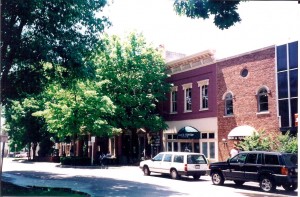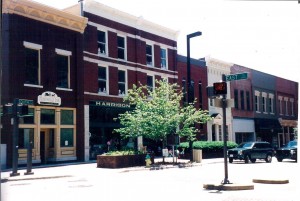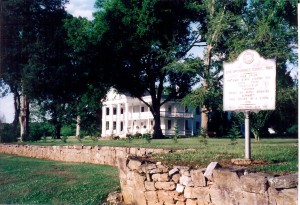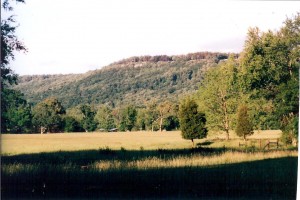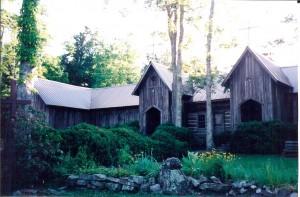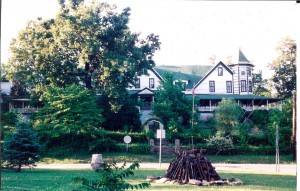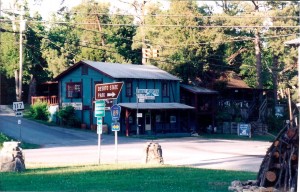Now that my traveling companion and I had settled into one place for the duration of our stay in Alabama, we developed a routine of breakfasting and showers. I had not really adjusted to Central Time, which was wonderful because I got to sleep in according to Eastern time, but was still on time for the locals. So we did not miss our big breakfast.
We headed off to Huntsville, feeling increasingly like we had left the rest of Alabama behind. The natural geography of this area reminded me of West Virginia rather than the Deep South. We were in hills and trees now, and embraced the change. We found our way to the old depot, passing the US Space and Rocket Center, only to discover that the town had suspended its trolley service. We wandered around the Depot Museum, where the walls preserve Confederate-era graffiti, and we found our first fellow travelers who were Northerners. During the Civil War, Union forces had captured the depot early on and used it to house Confederate prisoners until they could be transported by train to the prisons in the North. The bored Confederates wrote on the walls of the attic and it is now preserved and on display. The museum also provides some history of the railroad, which finally provided me with a direct connection to something in Alabama history, as my grandfather worked as an railroad engineer through the early part of the 20th century. A local has created a huge train set which provides a replica of Huntsville during the Civil War, with tiny Union and Confederate soldiers, outhouses, women, and babies surrounding the train. Designed for children, in includes buttons to push that replicate human and animal sounds. Despite its attention to detail, there were no miniature black people in the scene, whether slave or freedmen. Inside the Depot, there was a room devoted to strong Confederate women, and the welcome film made a point of tying the area strongly to the Deep South rather than its Appalachian surroundings. It provided the images of waving Confederate flags that we had not seen so far in our trip.
From the depot, we drove into the center of Huntsville. Compared to its Alabama counterparts, it was much more tree-lined and, therefore, shaded. We wandered around the square, visiting the Harrison Brothers Hardware, which opened in the late 19th century and remains in business. We found the Huntsville Confederate Soldier looking a bit better fed than his counterparts elsewhere in the state. I am disappointed to discover that I did not get a photo of him, as my notes indicate that he was my favorite Rupert of the trip. The shade and altitude made the place cooler, at times even chilly. People took little notice of us, as we would expect at home.
We decided to drive up into the surrounding hills to see a recommended view of the city, but we got lost, detoured, and lost again. We lost considerable time, and since it was mid-afternoon, we headed further northeast to see more of the mountains. We filled out tank for the third time in the trip, fueled ourselves with fast food, and arrived in Scottsboro to visit the Unclaimed Baggage Center. 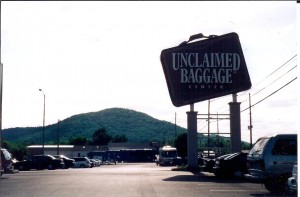
The center is a store that features the items that have been left unclaimed in the nation’s collection of airports, bus stations, and train depots. Eventually, they find their way to Scottsboro, where the Owens family sells them. We had no idea what to expect from the center, and thought we would ask a stranger there to photograph us and our trusty car. But once we were there, the place unsettled us. On the one hand, it felt like any outlet shopping center, lots of cheap goods displayed in bright lighting. On the other, once I started looking through the lost eyeglasses and combs, I began to have this sense of loss as if something truly horrible had happened to the owners of these items. We wound up purchasing nothing, although my friend was delighted to enjoy her first taste of Starbucks coffee since arriving in Alabama, something she had missed greatly. Given the sense of scavenging we saw in the customers, and the parking lot sign noting that the place was monitored by video cameras, we decided to leave without having our pictures made by strangers.
We had heard tell of a plantation that had been turned into a Bed and Breakfast up in the hills, called Antebellum Winston Place at the foot of Lookout Mountain, so we headed out into the beautiful countryside, enjoying the ever fresher air as we climbed. We arrived there, and found a well preserved plantation house. As we stepped out to photograph, we called the proprietors who not only gave us permission to roam the grounds, but offered to keep the dogs inside while we did, and came out to the car to greet us even though the were just sitting down to dinner. We were glad we called.
We pressed further up into the hills. We stopped at an old resort in a spa town, Mentone, and were chased away by the proprietress of a salon because she needed the parking space empty for an oxygen delivery for a sick family member.
My friend and I laughed away the burst of uncharacteristic rudeness that was clearly brought on by the stress of ill health in the household, but because the woman had directed her tirade more at my friend than at me, I began to wonder how much the racial history of the Deep South was wearing on her. The previous night she had fallen asleep with her glasses on, and when I attempted to remove them, she woke with a jump of complete fear and panic. In the second it took to recognize me and her surroundings, it was clear she was afraid of me. I could not help but wonder what kind of dreams she was having as we took in all this difficult history daily. It was not as easy for her to feel distant from it as it was for me, a child of early 20th century immigrants to the Great Lakes.
Night was coming upon us, so rather than head to the DeSoto Caverns, we ended our time around Lookout Mountain by going to Noccalula Falls in Gadsden, where there is a statue memorializing a Cherokee Indian princess who threw herself off the edge of the falls to prevent being married off as part of a political agreement because she was in love with another man. We arrived at the falls as the sun was setting, so apparently I did not take any good photos. This is a great shame, because my notes remind me that the drop was incredible and the statue provided the maiden with a look of peace, that she was smiling to herself as she was about to leap to her death.
When we had arrived at the park, we encountered our first live Confederate flag, displayed on the back of a pick-up truck. The men who were climbing into it were scary looking, and they spat on the ground as they boarded it. I felt glad they were leaving since it was just we little girls in the area with them. When we returned to the parking lot, we encountered a black family, dressed up as if they had come for a special event. They exchanged greetings with my friend. I was used to this racial segregation of greetings among strangers by this point, but was also struck how this failure of courtesy creates a feeling of hostility across race. For the first time in the trip, in this lonely parking lot, I felt the experience of being the sole representative of my race that my companion probably felt almost consistently throughout the trip. I can imagine that it wears a person down when in a place where it matters, and the power dynamic tilts against you.
We headed back to our last night at the hotel with one day before us. I realized I was glad to have had the break from grad school, but was ready to go about the business of summer, the sign of an effective vacation. But Birmingham awaited.

